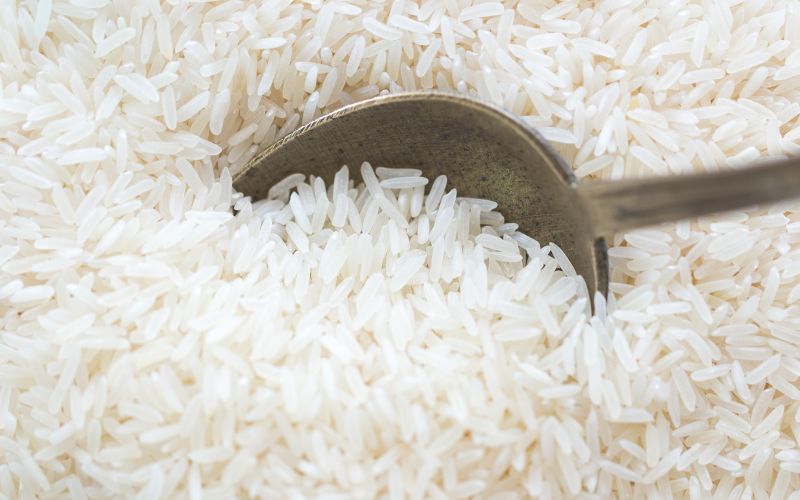Have you ever wondered if your furry friend can share the goodness of jasmine rice? The answer is yes, your beloved dogs can eat Jasmine rice, but do care about a proportion they can have for the benefit of good diets.
Many dog owners may not know that this fragrant grain provides noteworthy nutritional benefits for dogs, including B vitamins and essential minerals.
This comprehensive guide will outline how to safely incorporate jasmine rice into your dog’s diet, highlighting the incredible benefits and potential risks.
Get ready to open up a whole new world of canine culinary delights!
Key Takeaways
- Jasmine rice can be safely incorporated into a dog’s diet in moderation, providing essential nutrients like B vitamins, iron, and phytonutrients.
- It is essential to consult with a veterinarian before feeding jasmine rice to your dog and monitor their tolerance for allergies or sensitivities.
- Other types of rice that dogs can eat include brown rice, basmati rice, and long-grain rice. These options provide different nutritional benefits and add variety to their meals.
- When introducing jasmine rice or any other type of rice into a dog’s diet, it is crucial to gradually mix it with other dog-friendly ingredients for added nutrition and flavor.
Can Dogs Eat Jasmine Rice?
Dogs can safely eat jasmine rice in moderation, as it provides them with essential nutrients like B vitamins, iron, and phytonutrients.

Nutritional benefits of jasmine rice for dogs
Feeding your canine companion jasmine rice can offer a variety of nutritional benefits. Rich in B vitamins and iron, this type of rice supports overall health by contributing to essential functions in your dog’s body, from boosting energy levels to aiding digestive health.
Jasmine rice also provides phytonutrients, beneficial compounds that help fortify your puppy’s immune system against various health concerns. It serves as a satisfying source of carbohydrates for dogs while offering valuable nutrients often lacking in their typical diet.
The low sodium content makes it exceptionally safe for dogs on sodium-restricted diets or those who need help maintaining a healthy weight.
Feeding jasmine rice in moderation
Feeding jasmine rice to your dog can be a nutritious addition to their diet when done in moderation. Jasmine rice contains essential nutrients like B vitamins, iron, and phytonutrients that can contribute to your dog’s overall health.
However, it’s essential to keep the portion sizes small due to its high carbohydrate content.
Including jasmine rice as part of a balanced canine, diet can provide your furry friend with energy and help them feel satisfied after meals.
To prepare jasmine rice for your dog, boil it in fresh water until fully cooked. Please do not add seasonings or spices that may upset their stomach.
When feeding jasmine rice to dogs, it’s crucial to consider their dietary needs and consult a veterinarian beforehand. Introduce this grain gradually into their meals and monitor how they tolerate it regarding digestion and overall well-being.
While jasmine rice is generally safe for dogs, some pets may have allergies or sensitivities to grains. So, if you notice any adverse reactions such as itching, gastrointestinal distress, or changes in behavior after introducing jasmine rice into your diet, discontinue its use immediately and consult a vet for alternative options.
Cooking jasmine rice for dogs
To cook jasmine rice for your dog, start by rinsing the rice thoroughly to remove any excess starch. Then, add one cup of jasmine rice to two cups of fresh water in a pot and bring it to a boil.
Once boiling, reduce the heat to low and cover the pot. Let it simmer for 15-20 minutes or until all the water is absorbed and the rice is fluffy. Allow the cooked jasmine rice to cool completely before serving it to your dog.
This cooking method ensures the rice is fully cooked and easily digestible for your furry friend. Always consult your veterinarian before changing your dog’s diet or introducing new foods like jasmine rice.
Risks and Considerations
Feeding jasmine rice to dogs should be done with caution, as there is a potential risk of allergies or sensitivities, and it’s essential to monitor their digestion for any issues closely.
Potential allergies or sensitivities
While jasmine rice is generally safe for dogs, some individuals may have allergies or sensitivities. Like humans, dogs can react differently to different foods, including rice.
If you’re introducing jasmine rice into your dog’s diet for the first time, it’s recommended to start with small portions and closely monitor their reaction. Look out for any signs of discomfort, such as itching, skin irritations, digestive issues, or changes in behavior.
If you notice any adverse reactions, it may be best to consult your veterinarian before feeding your furry friend Jasmine rice.
Monitoring for digestive issues
When introducing jasmine rice into its diet, monitoring your dog for any digestive issues is crucial. While many dogs can tolerate and digest rice well, some may experience mild gastrointestinal upset such as gas or loose stool.
These symptoms are usually temporary and should resolve independently within a day or two.
To ensure your dog’s digestive health, offer a small portion of jasmine rice mixed with their regular food. Observe how they respond to the addition of rice to their meals.
If your pet experiences digestive discomfort, such as vomiting or prolonged diarrhea, it’s best to consult your veterinarian before giving them jasmine rice.
Other Types of Rice Dogs Can Eat
Brown rice
Dogs can safely eat brown rice as it is another type of rice that is suitable for them. It is a whole grain and contains higher amounts of fiber, vitamins, and minerals than white rice.
Brown rice provides dogs with essential nutrients such as magnesium, phosphorus, and B vitamins, which support their overall health.
The fiber content in brown rice helps regulate digestion and promotes bowel movements in dogs. Just like jasmine rice, it is vital to cook brown rice properly before feeding it to your furry friend.
Incorporating brown rice into your dog’s diet can be a healthy choice as part of a balanced canine meal plan.
Basmati rice
Dogs can safely consume Basmati rice as part of their white rice diet. It has a long grain and a distinct aroma, making it a flavorful option for your furry friend.
Basmati rice is rich in carbohydrates, which provide energy for your dog’s daily activities. Additionally, it contains essential nutrients like B vitamins and iron, promoting overall health in your canine companion.
When cooking basmati rice for your dog, boil it thoroughly in fresh water before serving. Be sure to introduce the new food gradually and consult a vet if you have concerns about adding basmati or other types of rice to your dog’s diet.
Long grain rice
Dogs can safely consume long-grain rice. Like jasmine rice, it is low in fat and easy to digest. The long grains are packed with carbohydrates, which provide energy for your furry friend.
Additionally, it contains essential minerals like iron, magnesium, and selenium that contribute to overall canine health.
Whether mixing it with other ingredients or feeding it plain, long-grain rice can be a great addition to your dog’s balanced diet. Just remember to cook the rice properly before serving it to your pup!
Tips for Feeding Rice to Dogs
Consult with your veterinarian for guidance on incorporating rice into your dog’s diet, gradually introduce it to prevent digestive upset, and consider mixing it with other dog-friendly ingredients for added nutrition and variety.
Read more about the best ways to feed rice to dogs in this article.
Consulting with a veterinarian
Before incorporating jasmine rice or any other type of rice into your dog’s diet, it is always essential to consult with a veterinarian. They can provide personalized advice based on your dog’s needs and health conditions.
A veterinarian can guide you on the appropriate portion sizes and frequency of feeding rice to your furry friend. Additionally, they can help monitor for any potential allergies or sensitivities your dog may have towards rice or grains.
Working closely with a vet ensures your dog’s diet supports its overall health.
Introducing rice gradually
When introducing rice to your dog’s diet, it is crucial to do so gradually. Mix a small amount of cooked rice with your dog’s regular food and slowly increase the portion over time.
This allows their digestive system to adjust to the new addition without causing any upset stomach or diarrhea.
By introducing rice gradually, you can ensure that your dog’s body can handle the added carbohydrates from the rice and prevent any potential digestive issues.
Consulting with your veterinarian before changing your dog’s diet is always recommended for their overall health and well-being.
So, take it slow, watch for adverse reactions, and enjoy incorporating nutritious jasmine rice into your furry friend’s meals!
Mixing rice with other dog-friendly ingredients
Mixing rice with other dog-friendly ingredients can add flavor and nutritional value to your furry friend’s meal.
Add cooked lean proteins like chicken, turkey, or ground beef to the rice for added protein content. These proteins are essential for muscle development and repair in dogs.
You can also mix some cooked vegetables, such as carrots or green beans, to provide additional vitamins and fiber. These veggies are packed with nutrients contributing to your dog’s overall health and digestion.
Moreover, you can drizzle a small amount of olive oil over the mixture to add healthy fats that promote shiny coats and support immune function.
Conclusion
Dogs can safely have jasmine rice as a diet. While it provides nutritional benefits and can benefit dogs with digestive issues, moderation is critical due to its high carbohydrate content.
Consulting with a veterinarian and introducing rice gradually are essential considerations when incorporating it into a balanced dog diet.
Other types of rice, such as brown and basmati rice, also offer options for variety in a dog’s diet.
